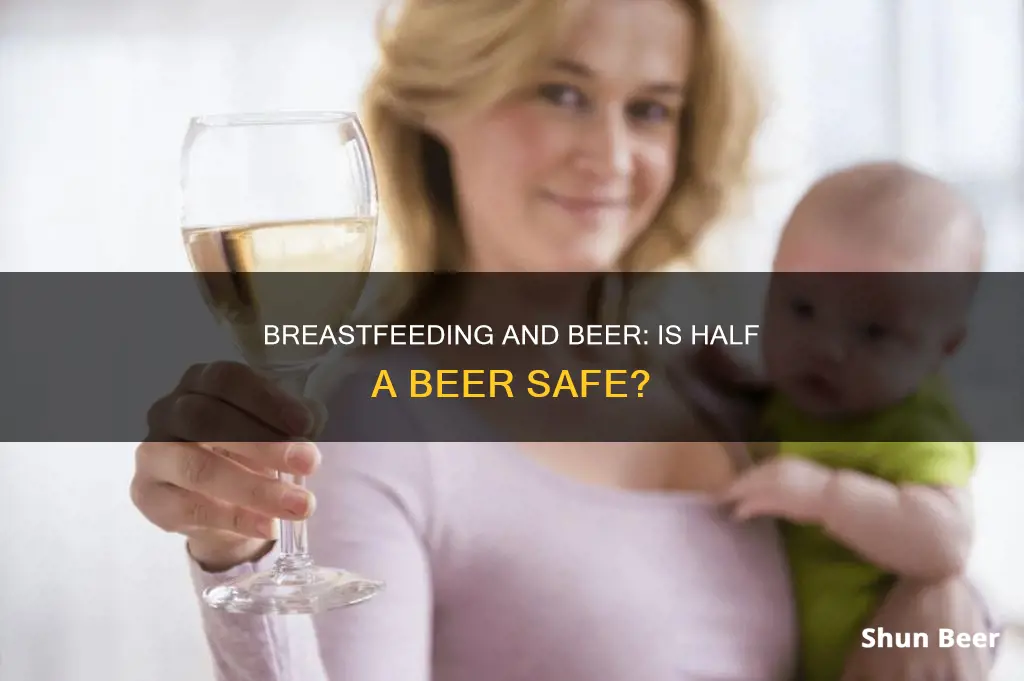
Drinking alcohol while breastfeeding is a topic of concern for many new mothers. While it is generally advised to abstain from alcohol during pregnancy, the question of whether it is safe to consume alcohol while breastfeeding is more complex. Most healthcare professionals agree that drinking small amounts of alcohol while breastfeeding is unlikely to harm the baby. However, opinions vary on the amount of alcohol that is considered safe for a breastfeeding mother. It is important to note that alcohol does pass into breast milk, and excessive alcohol consumption can disrupt a baby's sleep patterns and growth.
The effects of alcohol on breast milk production and the potential long-term impact on the baby's development are also important considerations. While some sources suggest that alcohol can increase milk supply, others indicate that it can hinder the milk ejection reflex and decrease milk production. To minimise the amount of alcohol reaching the baby, it is recommended to wait at least two hours after drinking before breastfeeding or pumping.
| Characteristics | Values |
|---|---|
| Is it safe to drink beer while breastfeeding? | According to the Centers for Disease Control and Prevention (CDC), the safest option is to abstain from alcohol while breastfeeding. However, occasional light drinking (one standard drink) while breastfeeding is likely fine. |
| How long should I wait after drinking beer to breastfeed? | It takes around two hours for the average adult to metabolize one drink. It is recommended to wait at least two hours after drinking one standard drink before breastfeeding. |
| Does alcohol affect breast milk production? | Yes, alcohol can affect the hormones that control breast milk production and reduce supply. |
| Is it true that beer increases breast milk supply? | The barley in beer boosts prolactin production, but the alcohol component decreases milk production and inhibits the milk ejection reflex. |
| Does alcohol pass into breast milk? | Yes, alcohol passes into breast milk. The highest levels of alcohol in breast milk are typically found 30-60 minutes after drinking. |
| Should I pump and dump after drinking beer? | Pumping and dumping does not remove alcohol from breast milk or speed up its metabolization. It is only necessary for comfort if you feel engorged. |
| What are the effects of drinking beer on breastfed babies? | Drinking beer can cause short-term effects on a baby's behaviour, such as increased awake times and irritability. It can also affect their sleep patterns, growth, and development. |
What You'll Learn

Is it safe to drink beer while breastfeeding?
The short answer is yes, it is safe to drink beer while breastfeeding, but only in moderation. According to the Centers for Disease Control and Prevention (CDC), the safest option while breastfeeding is to avoid consuming alcohol altogether. However, the occasional drink is okay, and you can safely nurse your baby after the alcohol has left your breast milk.
It is recommended to limit alcohol consumption to one drink per day. One standard drink is defined as:
- 12 oz. of 5% ABV beer (about one can)
- 8 oz. of 7% ABV malt liquor (around the size of a standard drinking glass)
- 5 oz. of 12% ABV wine (one glass)
- 1.5 oz. of 40% ABV (80-proof) liquor (one shot)
It takes about two hours for the average adult to metabolize one drink. This means that the alcohol has left your breast milk, and it is safe to breastfeed again. If you've had two drinks, wait four to five hours.
Drinking beer or any other type of alcohol while breastfeeding can have some risks, including:
- Negative effects on the milk ejection reflex and reduced milk supply
- Disrupted sleep patterns and increased agitation in the baby
- Potential long-term harm to the baby, including delayed motor development and impaired cognitive development
- Increased risk of Sudden Infant Death Syndrome (SIDS) if bed-sharing while under the influence of alcohol
Tips for drinking beer while breastfeeding:
- Plan ahead and time your drinks accordingly
- Breastfeed your baby before consuming alcohol, or pump and store milk beforehand
- Wait at least two hours after drinking one beer before breastfeeding or pumping again
- Avoid bed-sharing with your baby if you've been drinking alcohol
- Be aware of the potential for altered taste and smell of your breast milk, which may affect the baby's feeding
Is Old Beer Safe to Drink?
You may want to see also

How long should you wait after drinking alcohol to breastfeed?
It is recommended that breastfeeding mothers cut out drinking alcohol completely or limit their alcohol consumption. Alcohol does reach the baby through breast milk, and while the amount transferred is relatively small, the baby's liver is immature and cannot process and eliminate the alcohol as quickly as an adult.
The American Academy of Pediatrics recommends that breastfeeding mothers avoid alcohol. Research shows that drinking alcohol regularly may decrease breast milk production and affect how much milk the baby drinks. Alcohol has been shown to affect babies' sleep patterns, disrupting their sleep after even a small to moderate amount of alcohol.
If you do choose to drink, it is recommended that you wait at least two hours after drinking one standard drink before breastfeeding your baby. The more you drink, the longer it will take for the alcohol to clear your system. For example, alcohol from two drinks can be detected in breast milk for about four to five hours, and alcohol from three drinks can be detected for about six to eight hours.
It is important to note that the effects of alcohol on the baby are directly related to the amount of alcohol consumed. Even a small to moderate amount of alcohol may impair milk production and the milk ejection reflex. Some of the negative effects on the baby may include:
- Increased REM sleep in the period from 3.5 hours to 24 hours after exposure to alcohol
- Decreased milk intake by the baby
- Decreased weight gain
- Impaired immune function
- Delay of motor development
- Potential impairment of cognitive development
To reduce your baby's exposure to alcohol, it is recommended to breastfeed your baby immediately before drinking any alcoholic beverage or pump and save your milk. If your baby needs to be nursed before the two hours are up, use previously expressed milk to feed your baby.
Beer and Diabetes: What Diabetics Need to Know
You may want to see also

Does alcohol affect breast milk production?
Alcohol does affect breast milk production, but the extent of its impact depends on how much alcohol is consumed. Research has shown that even a small to moderate amount of alcohol may impair milk production and the milk ejection reflex.
A study by Mennella et al. found that nursing infants consumed less milk in the three-to-four-hour period after mothers consumed a small to moderate amount of alcohol. The research showed that infants consumed approximately 20% less breast milk, even though they nursed a similar number of times during this period.
Another study by Mennella and Beauchamp showed that infants consumed about 23% less milk. Mennella also found that when pumping milk two hours after drinking alcohol, mothers obtained significantly less milk.
The American Academy of Pediatrics recommends avoiding alcohol if you're breastfeeding, as alcohol does reach your baby via breast milk. The amount of alcohol transferred is relatively small, but a baby's immature liver means they process and eliminate alcohol more slowly than adults.
The barley used to make beer contains a polysaccharide that increases prolactin production, which stimulates breast milk production. However, alcohol on its own actually decreases milk production. Alcohol is a potent inhibitor of oxytocin, which stimulates milk ejection. The higher the alcohol intake, the greater the inhibitory effect.
Draught Beer: How Does It Work?
You may want to see also

What are the risks to the baby?
While drinking half a beer while breastfeeding is unlikely to cause harm to your baby, there are still risks to be aware of.
Firstly, alcohol can negatively affect your baby's sleep patterns. Research has shown that even small to moderate amounts of alcohol can disrupt your baby's sleep, resulting in shorter sleep periods, more frequent wakefulness, and reduced total active and REM sleep. These sleep disturbances can last for up to 24 hours after exposure to alcohol.
Secondly, alcohol can interfere with your baby's milk intake. Studies have found that nursing infants consumed approximately 20% to 23% less breast milk in the first four hours after their mothers consumed alcohol, despite spending a similar amount of time on the breast. This reduction in milk intake can lead to decreased weight gain in your baby.
Thirdly, alcohol can impair your baby's immune function and delay their motor and cognitive development. Regular exposure to alcohol in breast milk has been linked to potential impairment of cognitive development, including reduced ability for abstract reasoning at school age (6-7 years).
Additionally, excessive alcohol consumption can lead to drowsiness, deep sleep, and weakness in your baby. It can also affect your let-down reflex, resulting in a delay in milk ejection and reduced milk intake for your baby.
It's important to note that the effects of alcohol on your baby depend on various factors, including the amount of alcohol consumed, the timing of breastfeeding after alcohol consumption, and individual differences in metabolism. The more alcohol consumed, the longer it takes for the alcohol to clear from your system and your breast milk.
To minimise the risks to your baby, it's recommended to limit alcohol consumption to one drink per day or less and to wait at least two hours after drinking before breastfeeding or pumping. If you plan to drink more than one drink, it's advisable to wait four to five hours before nursing your baby.
Beer and Tylenol: Safe Mix or Health Risk?
You may want to see also

How does drinking alcohol affect the breastfeeding mother?
Drinking alcohol while breastfeeding can have several effects on the mother. Firstly, it is important to note that alcohol passes from the mother's bloodstream into her breast milk, with levels peaking around 30-60 minutes after consumption. This means that if a mother drinks alcohol, she should wait for a couple of hours before breastfeeding again to allow the alcohol to metabolize and leave her system and breast milk. The more alcohol consumed, the longer it will take to clear the body.
Secondly, drinking alcohol can affect the mother's milk supply and ejection reflex. Alcohol can disrupt the balance of hormones that control breast milk production, such as prolactin and oxytocin, leading to a reduced supply. It can also hinder the milk ejection reflex, resulting in the baby receiving less milk during feedings.
Thirdly, drinking alcohol can impact the mother's ability to care for her baby safely. Alcohol impairs judgment and reflexes, increasing the risk of unsafe sleeping arrangements, such as co-sleeping, which is associated with Sudden Infant Death Syndrome (SIDS). Therefore, it is crucial for mothers who have been drinking to ensure safe sleeping arrangements for their babies and to avoid co-sleeping.
Additionally, drinking alcohol can have short-term effects on the mother's behavior, such as increased irritability and altered sleep patterns. It can also affect the taste and smell of her breast milk, which may impact the baby's feeding behavior.
In conclusion, while occasional light drinking is not known to have adverse effects on the baby, regular or heavy drinking while breastfeeding is not recommended due to its potential impact on the mother's milk supply, the baby's growth and development, and the mother's ability to safely care for her child.
Beer and VSG: What You Need to Know
You may want to see also
Frequently asked questions
Yes, but it is advised to wait for a couple of hours before breastfeeding again.
It is recommended to wait for at least 2 hours after drinking half a beer before breastfeeding. If you've had two drinks, wait for 4 to 5 hours.
Drinking small amounts of alcohol while breastfeeding is unlikely to harm your baby. However, opinions vary on the amount of alcohol that is considered safe. It is best to avoid alcohol until your baby is over 3 months old.
Alcohol can affect the hormones that control breast milk production and reduce your supply. It can also inhibit the milk ejection reflex, resulting in the baby getting less milk.







